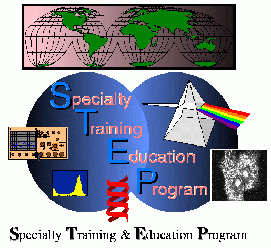


INTRODUCTION
At the XVI ISAC Congress a new educational/training program, which received
the name "Specialty Training & Education Program" (STEP) in Cytometry, was
initiated. Within a frame work of this program the continuing education
program in cytometry is organized by the selected par excellence
laboratories that are willing to provide training in particular
methodologies.
The training may assume a variety of forms. The participating laboratory may
accept the trainee for a week or two, to join the team and learn a particularly
methodology in a typical, informal "on the job training" form. It may wait
until a group of 2-4 persons will be willing to take the training at the same
time, and prepare more formal programs for such small groups. The laboratory
may also offer a tutorial course on particular methodology, attracting the
attendees through advertising in the ISAC Newsletter, for example. Other
tutorial methods may be tested, such as "leasing" an expert, who may then spend
several days teaching and demonstrating the methodology in other laboratories.
Several participating laboratories may organize a formal course, teaching the
basic or more specialized methods.
The role of ISAC in the program, through the STEP Committees, is in: (1)
identifying the laboratories which are capable of providing outstanding
training, technical advice, and expertise in particular fields of cytometry and
are willing to do so; (2) assessing the quality of training, and (3) making the
information of this program widely available.
The European and US STEP Committees already have been established. Several
outstanding laboratories have been identified and invited to participate. The
laboratories which accepted the invitation were asked to prepare a description
of the programs which they are willing to teach, the facilities, the
accommodations for the trainees, and other relevant details. This description
is included in the present STEP directory.
We envisage that initially the program will be rather informal, although the
training, from the very beginning, will be supervised by the STEP Committee.
Trainees will be requested to evaluate the training program they undertook
through review questionnaires. Periodically, the member(s) of the Committee
may inspect the participating laboratories. We anticipate that at a later
stage the laboratories will prepare a Practicum, a detailed description of
their methods and procedures. After evaluation by the Committee, the Practicum
will be offered to trainees. A collection of a variety of methodologies
prepared for the Practicum by different laboratories may be then edited by the
STEP Committee and published and/or be available at a nominal fee, to members
of ISAC. With time, some laboratories may offer formal accreditation for
training of special procedures. This, of course, will require additional
preparation and establishment of the means for testing the proficiency of the
training.
The fee for the training is subject to agreement between the involved parties,
i.e., the trainee and the training laboratory. The laboratory, to be
sponsored, evaluated, and advertised by ISAC, is expected to contribute 20% of
that fee to ISAC. Laboratories wishing to provide training as a service to the
community, free of charge, are encouraged to do so, and would receive the full
support of ISAC.
The instrument or reagent manufacturing companies, which otherwise themselves
provide the training as part of the sales, may be willing to offer vouchers for
STEP training, instead. Such an arrangement may be preferred by many customers
wanting to obtain the training that is specialized to their need. The reagent
manufacturing companies, on the other hand, may offer the vouchers to teach
methods that utilize their kits, thus promoting sales of their reagents.
One of the advantages of this program would be maintenance of this STEP
Directory by the STEP Committee in the Society Office. The Directory will be
available to all ISAC members, by regular mail and e-mail. Its presence will
be helpful not only to those who are interested in undertaking the training,
but also to everyone who needs to find an expert in a particular field or
methodology, e.g., with a request to help to solve some immediate
problem, seeking his advice, invitation to give a seminar, etc.
We are pleased to offer you this first STEP Directory. We greatly appreciate
the acceptance by the invited Laboratories to participate in this program.
Their presence in this Directory is not only an evidence of their excellence,
but also of their unselfishness and willingness to share their knowledge and
expertise with colleagues.
Zbigniew Darzynkiewicz
Many laboratories and institutions do not have the background or
knowledge to teach their employees special skills related to flow or image
cytometry. It is especially difficult to learn the newest techniques, since
most formal courses, which otherwise are extremely helpful, primarily teach the
basic skills and focus on few, rather established methods. The researchers
that enter the field, after purchasing instruments, often want to obtain the
training in selected methodologies that may be immediately useful for their
projects. There is indisputable need, therefore, for the mechanism of training
in cytometry that will provide a continuous opportunity to learn new skills.
J. Paul Robinson
